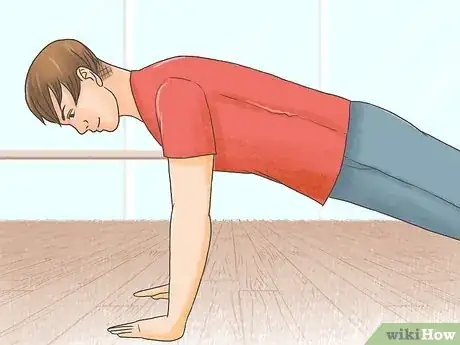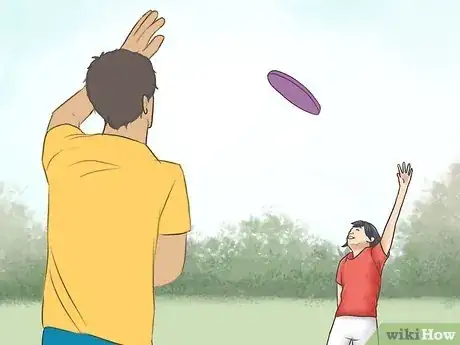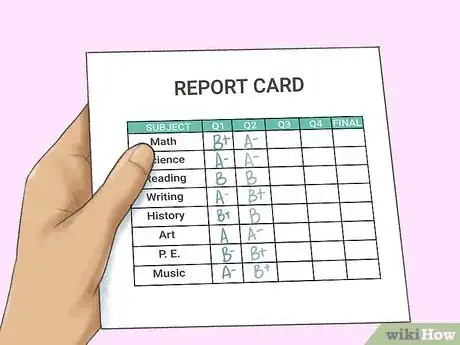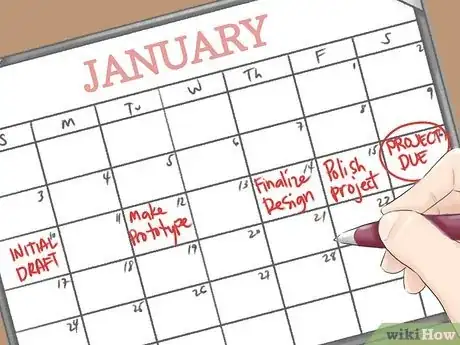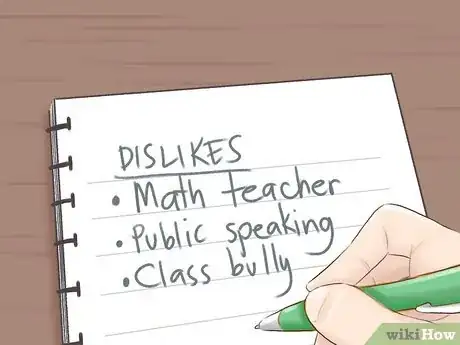This article was co-authored by César de León, M.Ed.. César de León is an Educational Leadership Consultant and currently serves as an Assistant Principal for the Austin Independent School District in Austin, TX. César specializes in education program development, curriculum improvement, student mentorship, social justice, equity leadership, and family and community engagement. He is passionate about eradicating inequities in schools for all children, especially those who have been historically underserved and marginalized. César holds a Bachelor’s degree in Education and Biology from Texas State University and a Master’s degree in Educational Leadership from The University of Texas at Austin.
There are 9 references cited in this article, which can be found at the bottom of the page.
This article has been viewed 200,170 times.
Even since the days of actual chalkboards, students have been struggling to maintain their concentration and composure for an entire school year. Fortunately, there are copious steps you can take to make the school year go by a bit faster, and even a learn a decent amount along the way. Broadly, you’ll need to make a solid effort to get more involved in your classes, and identify any issues that may be preventing you from having positive experiences at school.
Steps
Stimulating Your Brain
-
1Trick your brain into enjoyment. Even when a class is just plain boring, you can surprisingly convince your brain at least to some degree that you’re having fun. It sounds too good to be true, but try it. Simply think to yourself, "Hey, I’m actually kind of into this stuff. I’m starting to really enjoy this class.”[1]
- Believe it or not, the old adage that time flies when you’re having fun is actually supported by how your brain works.
- Accordingly, tell yourself you’re having fun even if you admittedly aren’t having a blast to make if feel like time is passing more quickly.
-
2Sit somewhere new. As simple as it sounds, changing your visual perspective of the world will help make time pass more quickly because your mind will be occupied by all the new information. Even the same classroom will look entirely different from a new angle. Your brain will be monitoring new information without you even thinking about it, making time pass more quickly.[2]
- Novelty can be a powerful tool to help you find joy in what you're doing, and enjoyment can help time fly by. It's easy to get stuck in a rut during the school year, but finding even small new stimuli can help get you out of those ruts.[3]
Advertisement -
3Take notes in a new format. An alternative method of taking notes is another way to provide your brain stimulation. This is also especially constructive, as you'll be thinking about how to organize the material that is being covered.[4] Try keeping notes in bullet points, short paragraphs, or even with small, relevant drawings every so often, and stick with what you enjoy.[5]
- When considering how to take notes differently, ask yourself "How can I convey this information in a more interesting, but equally accurate way?"
-
4Challenge yourself to follow the material more closely. Challenging ourselves with specific tasks increases the energy and excitement with which we approach that task. It works even better when the challenge has a bit of drama built in. To heighten your own level of focus, imagine a quick scenario in which you must complete the trying task of complete concentration, or else![6]
- For instance, pretend the teacher is a werewolf, but only morphs into a frothing-mouthed beast when she sees students eyes fully glaze over. There have been mysterious disappearances in her class every year. Can your class be the one that escapes unscathed, with full knowledge of the teacher’s lessons?
- Challenge yourself to accomplish specific tasks. If you’re usually quiet, make a point of speaking up next class. If you usually finish your in-class work quickly, see if you can work through something with another student who hasn’t finished.
Taking Advantage of Fun Opportunities
-
1Get physical during breaks or recess. In between classes or at recess, do something physical. Your breaks will be especially beneficial if you switch from your brain to your body at various points throughout the day. This will help get rid of the ants in your pants and rejuvenate your mind for consistent learning.
- Even if only for five minutes, find a corner where you can stretch or do a few yoga poses.
- Get the heart pumping by doing 10 pushups and 20 jumping jacks.
-
2Use weekends wisely too. Treat your weekends as breaks from school. Though you may need to catch up on some homework, don’t let school responsibilities dominate your weekend or the weeks will only continue to drag on and on. Plan something fun and, if possible, physically active every weekend.
- Invite kids who you don’t usually hang out with to join in on group activities. You may wind up with a new friend, a new study buddy, or both!
-
3Get involved in school activities or clubs. One way to ensure you’re always busy and socially engaged is by taking advantage of the extracurricular opportunities offered by your school. Join a sports team for an especially fun way to meet friends, stay healthy, and occupy your time constructively.
- Another great option is joining the school band. The ability to play an instrument is likely one that you’ll enjoy the rest of your life, and there’s something especially fun about band people.
- Another option, if available, is a drama club. Acting can prepare you for public speaking or presentations and can be a great way to try something new.
- Challenge yourself to find an activity outside of your comfort zone. When you are comfortable with something, it can get predictable or boring. Look for new opportunities for growth or seek out new people to help keep the year fun and interesting.
-
4Be social during the school day. At the very least, make a point of saying hello to other kids in the hallway.[7] Another trick to having more fun and being more social at school is taking advantage of silly holidays or other chances to add some spice to the day.
- If one of your classes is having a special event, or your school is holding some sort of soiree, dress the part.
- Not only is dressing up more fun than you might think, it’ll firmly place you in the fun crowd at school.
Getting More Involved in Your Classes
-
1Remind yourself of your responsibilities as a student. As a student, your most important responsibility is learning the material your classes cover. Not only will taking your classes seriously help make the school year go by quicker, it’s important to remember why you’re in school in the first place.[8]
- Reminding yourself of your responsibility to yourself as a student will help motivate you to show up to your classes ready and willing to learn.
- If your mind starts to wander during class, think to yourself “right now my best course of action is to pay attention.”
-
2Listen to your teacher during class. Listening fully will help you better comprehend the material and will likely increase your interest in class too.[9] As you’re listening, take notes about the things you find interesting or don’t fully understand, and think about any questions you may have.[10]
- If anything is unclear, raise your hand and ask about it. Know that other students will probably benefit from your question too.
-
3Interact with your teachers more. You don’t have to be the teacher’s pet in order to get along well with your teachers. If you’re bored in a particular class and can’t help thinking about stuff outside of class, talk to your teacher about it.[11] Remember that your teacher was a student once too![12]
- Ask to speak with your teacher after class. Let them know how you’re feeling.
- Say things like “I’m having a hard time getting into the course material and I’m wondering if you have any advice.”
- Ask your teacher about what interests them about the subject they teach!
-
4Reflect about how to approach tough classes or unpleasant teachers differently. Think about ways you can act differently during especially challenging or boring classes. The fact of the matter is that you’re not always going to enjoy every class or every teacher. But you can find something about every class and every teacher you can learn from. Take a moment to ask yourself, "What can I learn from this class?"[13]
- Find out if a teacher who may be a bit dry during lecture is more interesting to talk to one on one. They may even know a lot about something that interests you.
-
5Interact with your classmates more too. If you’re struggling or simply not enjoying a certain class, talk to other students that seem to be doing well or are engaged with the material. You can even ask them for tips. For instance, ask how they approach ideas they don’t understand at first, or what they use to help them with homework for that particular class.[14]
- Listen to your classmates’ questions too.
- Even if you think you understand the lesson, your classmates’ comments may make you see it in a more interesting way.
-
6Plan ahead. Set specific goals or deadlines for yourself, and decide on the specific steps you'll take to work towards each one. For instance, if you know you have a project due on Friday, start working on it the weekend before and think about ways you can improve it early in the week.[15]
- Planning ahead helps you complete specific assignments and achieve more general goals too.
- Avoid putting off homework or studying. This will add stress to your life and wind up leading to lower grades.
- Try using a calendar or day planner to help you stay organized, and to keep your thoughts organized about what you have to do and when. Better organizing your time will help it go by quicker!
-
7Take study breaks. The school day can drag on sometimes, in part because it’s a full day! Believe it or not, even adult brains can only focus for surprisingly short amounts of time. Whether between classes or between homework assignments, take a few minutes to do something fun or even just to rest quietly.[16]
- If you get up to walk around which can be a great way to stretch your body and prepare for another focused school session don’t allow yourself to get distracted by your phone or a TV, as these will make it harder to refocus on what you’re trying to learn.
Identifying Issues and Getting Help
-
1Find out why you don’t enjoy school. Sure, there’s homework, and the daily mini-traumas on interacting with other growing human beings. Still, you should be able to enjoy school most of the time. If you’re dreading school, or if it feels like torture all day, every day, there’s likely a reason you feel this way. The first step in addressing these sentiments is identifying where they’re coming from.[17]
- Ask yourself whether there are certain people you don’t want to see this may include other students who don’t treat you well, or a teacher that is impatient with you.
- Consider whether you’re feeling stressed about school itself, including classes and schoolwork.
-
2Recognize school-related stress. If one subject is especially challenging for you, or it feels like you’re falling behind your classmates, you may start to become worried or stressed. In turn, it may become harder to concentrate. Further, your body may be negatively affected by stress, making it even more challenging to focus in school, let alone enjoy it.[18]
- To begin to identify the specific things that are stressing you out, make a list of the things you don’t enjoy about school.
- Include both social and academic things on this list of negatives.
- If your stress is caused by bullying or teasing, seek help. Peer bullying is a serious issue that can have lasting consequences. If you're comfortable with it, try talking to your school counselor or administrator. Otherwise, you can look for resources on anti-bullying support websites.[19]
-
3Plan how you will address the aspects of school that you don’t enjoy. You’re capable of changing some of the situations that might make you dread school. Make a list of all the things you enjoy, to remind yourself that school isn't all bad. Then, revisit your list of negatives and plan how to improve your situation regarding each one.[20]
- If a lot of the negatives have to do with a particular subject or class, make a plan to talk with the necessary teacher and share the fact that you’re struggling with the material.
- If the negatives on your list tend to have more to do with people, recognize that you may need to get help addressing your ability to feel comfortable at school.
-
4Get help enjoying school! When you’re busy growing up, school can be challenging. And when you’re busy with school, growing up can bring some challenges of its own too. Fortunately, there are people who care about you that will be happy to help.[21]
- Talk to someone. Whether an older sibling, a parent, other relative, or a school counselor they’ve all likely faced similar challenges in their own lives and lived through them.
-
5Meet with a school counselor for anything at all. School counselors are specifically trained to help, and it’s their job to do so. Don’t ever hesitate to speak with a school counselor about anything at all especially if you’re being treated poorly by other students of a particular teacher.[22]
- If you’re unsure about meeting with a counselor because you don’t know how to convey what you’re feeling on a day-to-day basis, write your feelings out. This will help you organize your thoughts and identify what it is you might benefit from talking about.
Expert Q&A
Did you know you can get expert answers for this article?
Unlock expert answers by supporting wikiHow
-
QuestionWhy is school so boring?
 Paul Chernyak, LPCPaul Chernyak is a Licensed Professional Counselor in Chicago. He graduated from the American School of Professional Psychology in 2011.
Paul Chernyak, LPCPaul Chernyak is a Licensed Professional Counselor in Chicago. He graduated from the American School of Professional Psychology in 2011.
Licensed Professional Counselor
-
QuestionWhat if you are sad?
 Paul Chernyak, LPCPaul Chernyak is a Licensed Professional Counselor in Chicago. He graduated from the American School of Professional Psychology in 2011.
Paul Chernyak, LPCPaul Chernyak is a Licensed Professional Counselor in Chicago. He graduated from the American School of Professional Psychology in 2011.
Licensed Professional Counselor
References
- ↑ http://education.seattlepi.com/make-day-faster-school-1293.html
- ↑ http://education.seattlepi.com/make-day-faster-school-1293.html
- ↑ https://journals.sagepub.com/doi/full/10.1177/0146167217752361
- ↑ César de León, M.Ed.. Educational Leadership Consultant. Expert Interview. 11 November 2020.
- ↑ http://education.seattlepi.com/make-day-faster-school-1293.html
- ↑ http://education.seattlepi.com/make-day-faster-school-1293.html
- ↑ César de León, M.Ed.. Educational Leadership Consultant. Expert Interview. 11 November 2020.
- ↑ http://kidshealth.org/en/kids/getting-along-teachers.html#
- ↑ César de León, M.Ed.. Educational Leadership Consultant. Expert Interview. 11 November 2020.
- ↑ http://kidshealth.org/en/kids/getting-along-teachers.html#
- ↑ César de León, M.Ed.. Educational Leadership Consultant. Expert Interview. 11 November 2020.
- ↑ http://m.kidshealth.org/en/teens/teacher-relationships.html?WT.ac=m-t-ra
- ↑ http://m.kidshealth.org/en/teens/teacher-relationships.html?WT.ac=m-t-ra
- ↑ http://m.kidshealth.org/en/teens/teacher-relationships.html?WT.ac=m-t-ra
- ↑ http://kidshealth.org/en/kids/studying.html?WT.ac=en-k-homework-b#
- ↑ http://kidshealth.org/en/kids/studying.html?WT.ac=en-k-homework-b#
- ↑ http://kidshealth.org/en/kids/hate-school.html?WT.ac=k-ra
- ↑ http://kidshealth.org/en/kids/hate-school.html?WT.ac=k-ra
- ↑ https://www.stopbullying.gov/
- ↑ http://kidshealth.org/en/kids/hate-school.html?WT.ac=k-ra#
- ↑ http://kidshealth.org/en/kids/hate-school.html?WT.ac=k-ra#
- ↑ http://kidshealth.org/en/kids/hate-school.html?WT.ac=k-ra#





